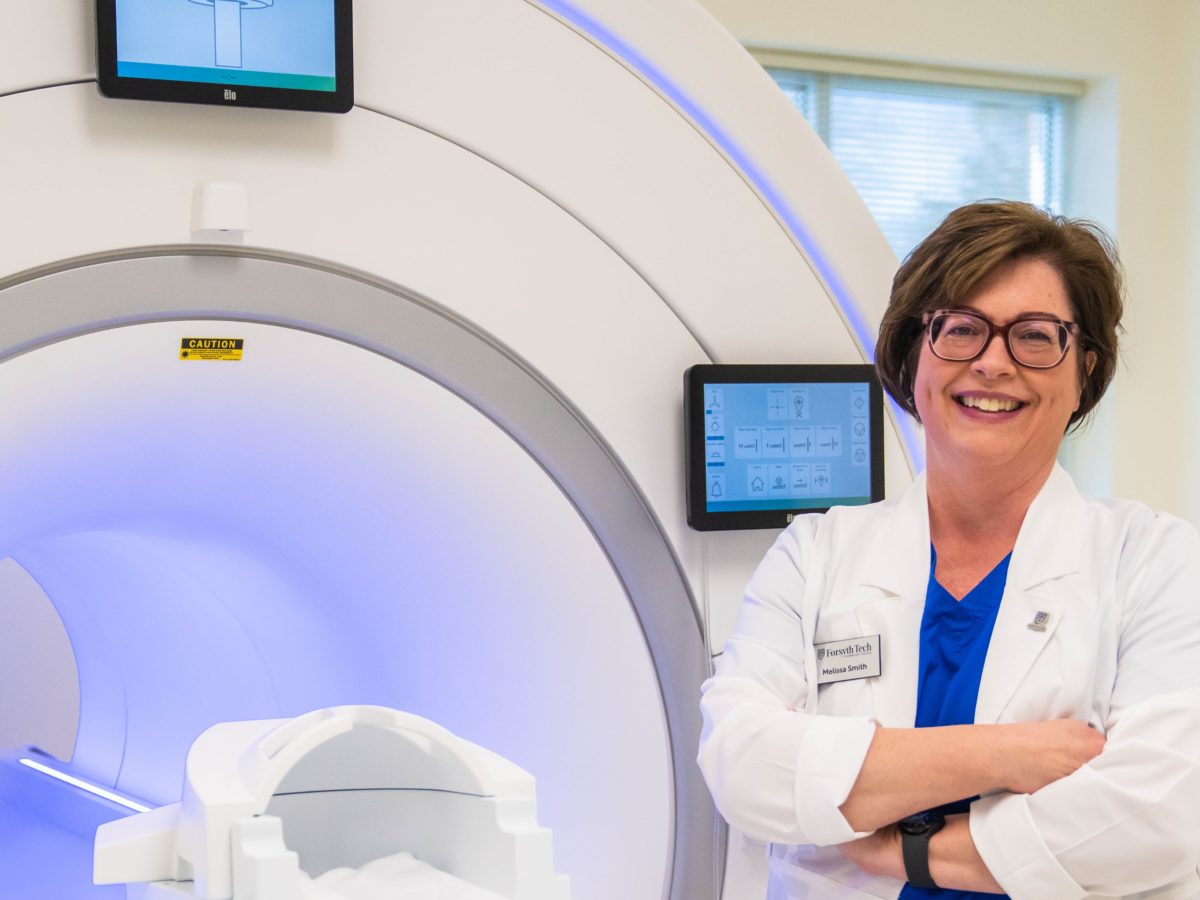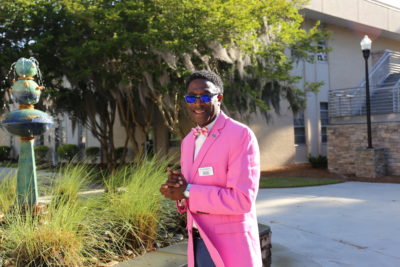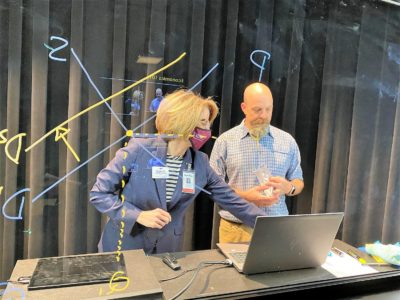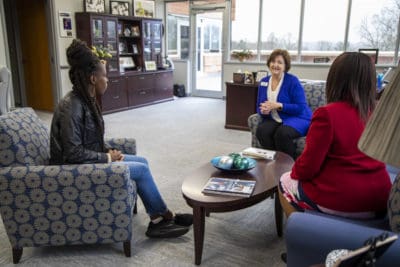
|
|
For Forsyth Technical Community College’s Melissa Smith, helping students achieve their goals despite barriers is the best part of her job.
As the program coordinator of Magnetic Resonance Imaging (MRI) at Forsyth Tech — a role she’s held for nearly a decade — Smith is able to focus on doing just that for the college’s MRI students.
“My favorite moments are when students graduate and they pass their boards, and I love all my students, but it’s really for the ones who have struggled and worked so hard,” Smith said. “Maybe they don’t have the best background or they don’t have support, and just providing them support and seeing them go from making $5 an hour to making $30 an hour and having a whole new life — it is so gratifying and so exciting.”
Smith started as Forsyth Tech as a full-time instructor in 2010 and moved to the program coordinator position two years later. Before that, she worked part-time as a clinical instructor for nearly three years while also working as a MRI technologist.
In January, Smith was recognized for her work as the recipient of the State Board of Community College’s Excellence in Teaching Award, which she received for her work with admissions staff to increase student diversity and help securing a grant for an MRI simulator during the pandemic. Smith was also “instrumental in the FTCC MRI Program receiving a 100% pass rate for the post-graduate American Registry of Radiology Technologists MRI Registry three times in the last nine years,” the state Board release says.
“I got the phone call and they said, ‘You won,’ and I was like, ‘No way,’” Smith said. “I read the background on all the other teachers and they’re just all doing incredible work. So you just think, ‘Man, there is no way I will win this.’ And then to know, it’s like, oh my gosh, how exciting not just for me, but for the college and my students, and just as a community college graduate, really, I was so proud.”
‘Making sure students succeed’
A graduate of Forsyth Tech herself, Smith returned to the college after working in the field for 10 years. In the 14 years since she first began teaching, she’s been glad to see a shift in viewing students more holistically — at Forsyth Tech and at other North Carolina community colleges alike.
College is a challenge for all students, Smith said, but community college students in particular often face additional challenges with finances, balancing family and work responsibilities with school, or a lack of family support.
“They’re juggling a lot,” Smith said. “We’ve always tried to help students in those wraparound services and finding them resources, but during the pandemic, we are really making sure students succeed, not just academically, but that they are well mentally, that they have the things they need to be successful.”
Jorga Waugh, who graduated from Forsyth Tech in 2021, now works as a MRI technologist in Mount Airy.
During her second year at the college, Waugh was struggling to figure out the prerequisites she needed. That’s when she first met Smith.
“My prereqs actually changed in the middle of me taking them, but she was extremely helpful. She said, ‘You know, we have some bad news, but we can fix this,’” Waugh said. “That was pretty much the start of our relationship, and she’s always been so supportive with me and anything I’ve ever needed.”
Though Waugh knew she wanted to be an MRI technologist from a young age, it took her a few years to get accepted into the program. Smith was an important part of helping her prepare to enter the program, Waugh said.
When she finally was accepted, Smith delivered the news herself.
“And she was so excited,” Waugh said. “I came from a pretty rough background and not much money, but she was there all the way and she always had someone to help me get in contact with if she couldn’t help herself. She’s always been pretty much like a motherly figure to me — not just my teacher, but she’s a good friend, and she means a lot to me.”
Smith connected Waugh with her Mount Airy job, the place she’d started out at some 20 years earlier.
“She is deserving because she’s a great teacher,” Waugh said of Smith’s teaching award. “She’ll do what it takes to help all her students achieve their goals, and she’s always had her students back — even after graduation.”
‘About what is best for the student’
Sharilyn Owens, the mathematics department chair at Forsyth Tech, has worked with Smith for a decade now. According to Owens, Smith is a “can-do person” who is flexible, willing to try new things, and a good leader through difficult conversations.
“I’ve been math chair and she’s in the health field, so I’ve not experienced her teaching per se, but I do know that everything that she does has the face of a student on it,” Owens said, “And it is about what is best for the student.”
The two jokingly refer to themselves as the famous sitcom duo Laverne and Shirley, a nod to their “work sister” relationship. Owens cried when she realized Smith received the state Board award, she said.
“I know there are a lot of worthy applicants and a lot of worthy nominees. I’ve heard Melissa say herself, ‘Anyone at my college could’ve received this award,’’’ Owens said. “It is a gift to faculty everywhere to see someone like Melissa, who is so deserving, actually be recognized. While she was giving it her all, that she was nominated and recognized for doing that without calling attention to herself or needing the attention is really special.”
Sharilyn Owens
Smith continues to work with Forsyth Tech to expand the MRI program’s pathways and certificates, in hopes of creating as many entry points to the field as possible. Moving forward, Smith wants to add apprenticeships and internship models to the program.
And in May, Smith will begin her doctorate in community college leadership at N.C. State University — in addition to all her teaching and coordinator responsibilities. She hopes to learn more about helping students succeed, particularly when it comes to the importance of good mental health and an equitable admissions process.
“I think that with a lot of community college educators, we are just lifelong learners,” Smith said. “So just trying to find ways to learn and grow — not just in our craft or in a business profession of teaching, but to make us holistically better people, so that we can use that to work with our students.”





